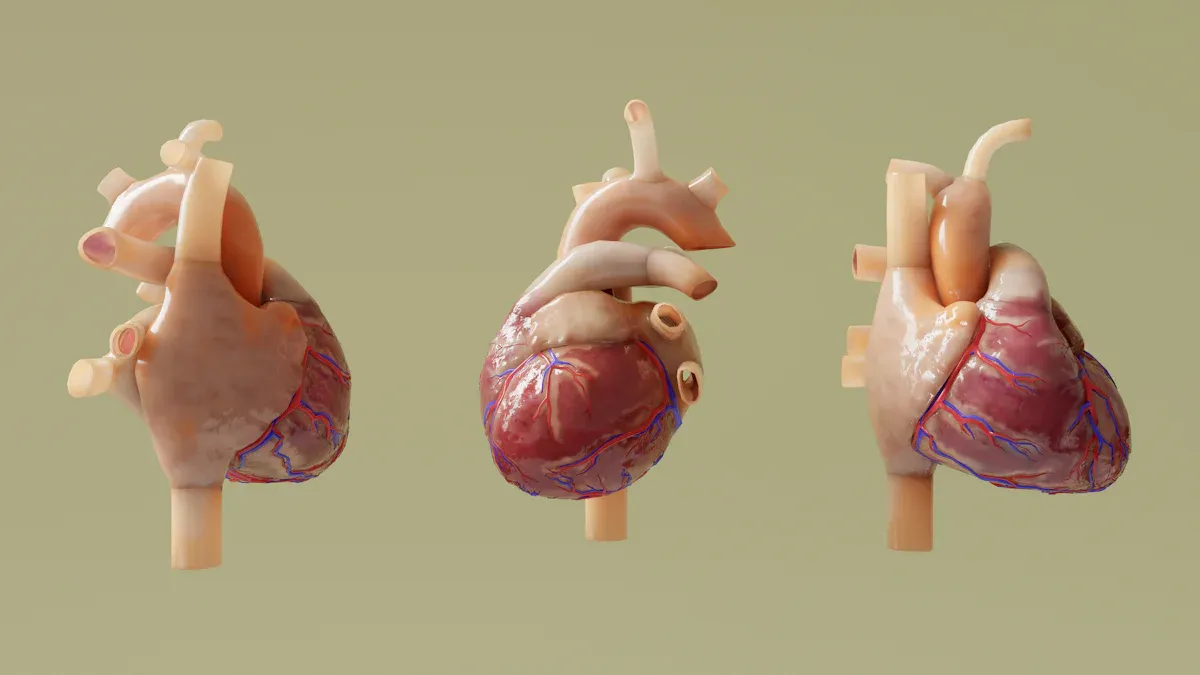News & Events
3 ways panel reactive antibody protects your transplant

You want your transplant to last as long as possible. Panel reactive antibody testing plays a key role in this process. Many patients waiting for a kidney transplant undergo this testing because it helps doctors see if your immune system has made certain antibodies. This information allows your team to:
- Find the best donor match
- Choose the right medications for you
- Spot problems early
You can learn more about your antibody makeup and HLA antibody testing through trusted resources. Understanding your panel-reactive antibody results gives you more control and confidence in your transplant journey.
Key Takeaways
- Panel reactive antibody testing helps find the best donor match for your transplant, increasing the chances of success.
- Understanding your antibody levels allows doctors to tailor your medication plan, balancing protection from rejection with minimizing side effects.
- Regular monitoring of panel-reactive antibodies after transplantation helps detect potential rejection early, leading to timely interventions.
- High antibody levels can increase the risk of rejection; proactive management can improve your overall survival and transplant outcomes.
- Engaging with your transplant team about antibody testing empowers you to take control of your transplant journey.
Panel Reactive Antibody and High-Risk Matches

Assessing Sensitization
You need to know how your immune system reacts before a transplant. Panel reactive antibody testing helps you and your doctors see if your body has made antibodies against human leukocyte antigens (HLA). This process uses microspheres coated with HLA antigens. When your serum mixes with these microspheres, any anti-HLA antibodies in your blood will attach to them. This step gives a clear picture of your sensitization status. Sensitization means your immune system has learned to recognize and attack certain antigens, which can affect transplant outcomes.
There are several ways to measure sensitization:
- Panel reactive antibody score: Shows how many HLA antigens your antibodies react to.
- Calculated PRA (cPRA): Focuses on unacceptable HLA types, using data from the donor population.
- Solid phase immunoassays: Use beads or wells with HLA proteins for more accurate results.
- Virtual crossmatch: Compares your antibodies with donor antigens using bead technology.
Improving Transplant Compatibility
If you have a high panel-reactive antibody level, you face more challenges in finding a compatible donor. For example:
- Candidates with cPRA over 50% are high-risk matches.
- Those with cPRA between 50.1–75% are 25% less likely to receive a lung transplant and 44% more likely to die while waiting.
- cPRA between 75.1–100% means a 52% lower chance of transplant and a 92% higher risk of dying on the waitlist.
| PRA Level | Positive Crossmatch Incidence |
|---|---|
| >50% | 72.3% |
| ≤50% | 14.6% |
| 0% | 7.2% |
Doctors use this data to guide donor selection and improve your chances of a successful transplant. They may use desensitization treatments like plasma exchange, IVIG, or rituximab to lower antibody levels and increase compatibility.
Reducing Antibody-Mediated Rejection Risk
High panel-reactive antibody levels increase the risk of antibody-mediated rejection, which can harm your new heart or other organs. Sensitizing events like previous transplants, pregnancies, or blood transfusions raise this risk. Patients with high pre-transplant PRA often have more ventilator days, higher rates of acute antibody-mediated rejection, and lower survival. Treatments such as IVIG with rituximab or eculizumab can help prevent both acute and chronic antibody-mediated rejection, improving overall survival rate and freedom from amr. By understanding your antibody profile, you and your team can take steps for prevention, better treatment, and improved clinical outcomes in heart transplantation.
Personalized Immunosuppression for Transplant Patients

Using Panel-Reactive Antibody Results
You play a key role in your transplant journey. Panel-reactive antibody testing gives your transplant team important data about your immune system. By measuring your pre-transplant antibody levels, doctors can identify which antibodies you have against donor antigens. This process helps your team avoid unacceptable antigens and choose the best donor for you. Modern methods like flow cytometry and solid-phase immunoassays improve the accuracy of antibody detection. These advances help predict rejection and improve graft survival. You benefit from precise testing because it guides your treatment and increases your overall survival rate after heart transplantation.
Tailoring Medication Plans
Your panel-reactive antibody results help your doctors create a medication plan just for you. Patients with high antibody levels need stronger immunosuppression to prevent antibody-mediated rejection. Those with lower levels may need less medication, which reduces side effects. The transplant team uses your data to balance protection from rejection with your safety. You can see the clinical impact in the outcomes below:
| Outcome Description | Result | Notes |
|---|---|---|
| No episodes of pAMR2 or greater | Yes | Follow-up beyond the first year |
| No Left Ventricular dysfunction | Yes | Follow-up beyond the first year |
| Deaths | 3 | During the follow-up period |
| Episodes of pAMR1 | 1 | During the follow-up period |
| Minimal de novo cardiac allograft vasculopathy | 1 | During the follow-up period |
| Hazard ratio for primary end-point | 0.50 | Non-statistically significant |
| Hazard ratio for mortality | 0.51 | Non-statistically significant |
You can see that tailored medication plans based on antibody data lead to better outcomes and more freedom from amr. This approach improves survival and reduces the risk of acute cellular rejection and chronic antibody-mediated rejection in heart transplantation.
Preventing Antibody-Mediated Complications
You want to avoid complications after your transplant. Adjusting immunosuppression according to your panel-reactive antibody results helps prevent antibody-mediated rejection and other problems. Patients with higher antibody levels face a greater risk of delayed graft function and biopsy-proven rejection. The table below shows the impact of antibody levels on outcomes:
| PRA Percentage | Incidence of Delayed Graft Function | Incidence of Biopsy-Proven Rejection |
|---|---|---|
| 0-20% | Low | Low |
| 21-40% | Moderate | Moderate |
| 41-60% | High | High |
| 61-100% | Very High | Very High |
You can lower your risk by following your medication plan. Patients who stick to their immunosuppression regimen have a lower annual incidence of de-novo donor-specific antibodies, around 2%. This prevention strategy leads to better clinical outcomes and more freedom from amr. You protect your heart and improve your survival by working closely with your transplant team.
Monitoring and Early Action Against Antibody-Mediated Rejection
Ongoing Panel Reactive Antibody Testing
You need regular panel-reactive antibody testing after your transplant to protect your heart and improve survival. Doctors check your antibody levels often, especially during the first month after transplantation. This helps them spot changes that may signal rejection. You benefit from ongoing monitoring because it gives your team the data needed to act quickly.
- A total of 465 panel-reactive antibody determinations were made in the first year after transplantation.
- Mean panel-reactive antibody values peaked during the first month.
- Positive dithioerythritol-treated panel-reactive antibody results became rare after the first month.
Pre-operative screening for panel-reactive antibodies helps assess your transplant candidacy. If your panel-reactive antibody test is positive, doctors recommend a donor-specific antibodies assay. After your transplant, post-operative donor-specific antibody testing is essential for diagnosing antibody-mediated rejection in suspected cases.
Detecting Donor-Specific Antibodies
You want to avoid antibody-mediated rejection and improve your post-transplant outcomes. Detecting donor-specific antibodies early makes a big difference in clinical impact. Doctors use regular panel reactive antibody testing to find these antibodies before they cause harm. The table below shows how early detection affects outcomes:
| Key Findings | Details |
|---|---|
| Early DSA Detection | 13.9% of patients developed donor-specific antibodies within 3.8 years. Median time to first DSA appearance was 1.5 months post-transplantation. |
| Risk Factor | Early-DSA (8.5%) is an independent risk factor for antibody-mediated rejection. |
| High-Risk Patients | Early DSA screening is crucial for patients with more HLA sensitization at the time of transplant, indicating alloimmune memory. |
If your calculated panel reactive antibody (cPRA) level is 50% or higher, you face a greater risk of antibody-mediated rejection and shorter AMR-free survival. Doctors use this data to guide prevention and treatment.
| cPRA Level | Risk of AMR | AMR-free Survival |
|---|---|---|
| ≥50% | Significant predictor of AMR risk | Shorter duration of AMR-free survival |
Early Intervention to Protect the Transplant
You protect your heart and improve overall survival rate when your team acts fast against antibody-mediated rejection. Early intervention starts with prompt detection of rising antibody levels and donor-specific antibodies. Doctors use several strategies to prevent and treat antibody-mediated rejection:
| Intervention Strategy | Description |
|---|---|
| Avoid transplantation in highly sensitized patients | Prevents potential antibody-mediated rejection by not exposing these patients to high-risk situations. |
| Paired kidney exchange | Matches donors and recipients to reduce sensitization and improve transplantation outcomes. |
| Removal of donor-specific antibodies | Techniques like plasmapheresis and immunoadsorption eliminate harmful antibodies. |
| Anti-B cell agents | Medications such as rituximab target B cells that produce donor-specific antibodies. |
| Anti-plasma cell agents | Proteasome inhibitors like bortezomib reduce plasma cell activity. |
| Inhibition of complement cascade | Eculizumab blocks the complement system, lowering antibody-mediated rejection risk. |
| Intravenous immunoglobulin | Modulates immune response and reduces donor-specific antibody levels. |
You gain freedom from amr and better clinical outcomes when your team uses these treatments. Early action lowers the risk of acute antibody-mediated rejection, chronic antibody-mediated rejection, and acute cellular rejection. You improve your heart transplantation outcomes and survival by staying proactive with your transplant team.
You protect your transplant by understanding panel reactive antibody testing. This testing helps patients find better matches, guides medication plans, and allows early action against rejection. Patients who monitor antibody levels see improved outcomes and lower rejection rates.
| Cohort | 10-Year Overall Graft Survival | Death-Censored Allograft Survival |
|---|---|---|
| PRA-0 | 69.1% | 82.2% |
| AM | 62.0% | 72.2% |
| PRA-6/84 | 47.8% | 65.4% |
| PRA Level | Patient Survival | Allograft Survival | Rejection Rate |
|---|---|---|---|
| 0% | Best | Best | Lowest |
| 1%-10% | Good | Good | Low |
| 11%-25% | Moderate | Moderate | Moderate |
| >25% | Worst | Worst | Highest |
You should talk with your transplant team about antibody testing and follow-up care. Staying proactive helps patients achieve the best clinical impact and long-term outcomes.
FAQ
What is panel-reactive antibody testing and why do you need it before a transplant?
Panel-reactive antibody testing shows if your immune system has made antibodies against donor antigens. You need this test before a transplant to help doctors find the best match and lower your risk of rejection.
How does panel-reactive antibody testing affect your medication plan after heart transplantation?
Your panel-reactive antibody results guide your doctors in choosing the right immunosuppression. If you have high antibody levels, you may need stronger medication to prevent antibody-mediated rejection and improve your overall survival rate.
Can panel-reactive antibody testing help prevent acute antibody-mediated rejection?
Yes. Regular testing helps your team spot rising donor-specific antibodies early. Quick action lowers your risk of acute antibody-mediated rejection and improves post-transplant outcomes for patients.
What is the impact of donor-specific antibodies on transplant outcomes?
Donor-specific antibodies increase your risk of rejection and lower freedom from amr. Early detection and treatment of antibody-mediated rejection can improve your clinical impact and survival after heart transplantation.
How often should you get panel-reactive antibody testing after transplantation?
Doctors recommend frequent testing, especially in the first month after your transplant. Ongoing monitoring helps detect antibodies and allows early treatment, which improves transplantation outcomes and protects your heart.

